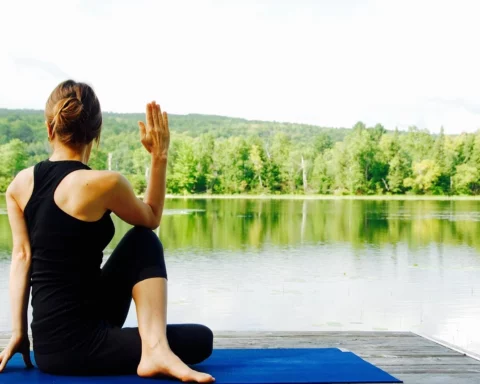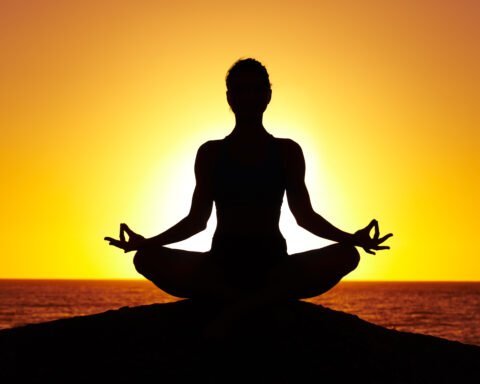Yoga is a meditation movement that combines concentration with deep breathing and physical activity. The practice originated 3,000 years ago and is based on Indian philosophy, yet there are many schools or forms of yoga. Each variation emphasizes different posture or exercise, breathing techniques, and meditation techniques.
There are many positive effects that yoga can have on good health, including improved mental and emotional health and stress, relief from other types of pain, weight loss, and improved sleep. This article focuses on yoga, good sleep, and relaxation. Before that, we are going to list the general benefits of yoga, which include:
- Increases flexibility
- Reduces insomnia
- Lowers blood pressure
- Increases muscle strength and tone
- Improves respiration, energy, and vitality
- Maintains a balanced metabolism
- Reduces weight
- Improve cardio and circulatory health
- Improves athletic performance
- Protects from injury
Does Yoga Help You to Sleep?
More than 55% of yoga partakers have reported improved sleep, and more than 85% have reported less stress. Voluminous research has indicated that yoga can enhance the sleep of many different people. These studies often focus on a person’s quality of sleep rather than quantity, as rising sleep costs are not matched by quality sleep and overall health. Even though the definition of quality sleep varies with an individual, it usually includes feeling energized during the day and a lack of distraction.
Who Does Yoga Help Sleep Better?
Yoga has been proved to benefit all ages for improved sleep. From children to adults, yoga offers many benefits for health and sleep.For instance, sleep disorders are mostly found among children with Autism Spectrum Disorder. Yoga as a behavioral intervention can reduce stress in children with ASD and improve their mental health, which can help with difficulty in sleeping. It can also help parents and generally the well-being of the whole family.
Older women, in particular, are more likely to have difficulty sleeping than men. Studies have shown that yoga can be of benefit to many women. For example, pregnant women who practice yoga have reduced sleep disturbances and reduced postpartum anxiety and stress. Women in menopause who practice yoga also experience similar effects; they have improved sleep and reduced depression and anxiety.
Adult statistics also often report having sleep disorders. These disorders range from numbness to tingling in the rest of the legs (RLS), affecting a person’s overall quality of life. Preliminary studies have shown that adults who regularly practice yoga have improved sleep quality and quality of life.
Which Yoga Frequency is Needed to Improve Sleep?
Occasional yoga practice will probably improve the quality of sleep rather than the complete absence. However, regular and long-term yoga will yield better results.If you intend to use yoga as a tool to improve sleep, consider creating a schedule where you exercise regularly. This may include attending weekly classes, setting aside some time for the day to exercise at home, or a combination of both.
Ways in Which Yoga Helps Improve Sleep
There are many ways yoga can help improve sleep quality:
- Consideration is the practice of awareness without judgment at present. Meditation is a common part of many forms of yoga.
- Contemplation can increase melatonin levels and reduce nighttime sleep disorders in adults.
- Respiratory awareness and regulation. These are also the characteristics of yoga. Deep breathing is a form of relaxation that can keep a person asleep.
- Regular exercise. Regular movement is an important aspect of sleep hygiene. Moderate exercise a few times a week can improve overall sleep.
- Weight loss. Although weight loss may not be the primary goal for some yoga practitioners, weight loss can benefit sleep. Weight loss will be followed by fatigue and constant tiredness.
Some sleep disorders can positively affect the traditional practice of yoga.
Yoga and Insomnia
Insomnia is the inability to sleep or to stay asleep. Insomnia can have many long-term consequences, including drowsiness and paralysis during the day, memory loss, and mood swings. The study by Khalsa, S. B. S. (2004).showed that yoga can effectively control sleep disorders such as chronic insomnia. Yoga can be especially beneficial for certain people with insomnia, such as postmenopausal women and women dealing with breast cancer conditions.
Yoga and Restless Leg Syndrome (RLS)
Restless leg syndrome (RLS) is a condition that makes one move legs that are often unpleasant or painful. This desire often occurs during periods of inactivity, such as at night. RLS affects women more than men.In a study by Innes, & Selfe, (2012). on a few patients with restless leg syndrome, their RLS symptoms dropped dramatically after just eight weeks of yoga classes. Sleep, stress, and mood were all much better. Although further research is needed, these results suggest that yoga is a good tool for improving sleep in patients with RLS.
Yoga for Relaxation
Research by Smith, et al. (2007)., showed that apart from good sleep, yoga has other benefits, and relaxation is one. Let us dive deep into yoga for relaxation.Yoga promotes relaxation of the mind and body, which helps to reduce stress and anxiety. Body posture promotes flexibility, relieves tension, and reduces pain.
Yoga posture can help to release physical barriers such as muscle knots, helping to release emotions and stress. They also promote the release of endorphins, which stimulate emotion, a pleasure hormone that can positively affect your stress response.
During yoga practice, focusing on modern times enhances your awareness, increases your concentration, and concentrates the mind.As you become aware of the transcendent nature of your physical, mental, and emotional makeup, you may find it easier to let go of the attachment to good, bad, and neutral experiences. You can also learn to cultivate such qualities as love, joy, and serenity. Different postures in yoga yield different results that focus on relaxation of the mind and the body.
Conclusion
Yoga is one physical activity that has received many descriptions worldwide. Some find it fascinating and relaxing, while others find it weird. No matter what one thinks about yoga, it has been proven to be one of the most relaxing physical and mental activities that people of all ages can undertake. Be it children, adolescents, and the elderly.Yoga has also proved to have many physical health and mental health benefits. As outlined in this article, yoga helps people relieve stress, relax their muscles and improve their sleep. If you haven’t started practicing yoga, you will never regret making it a consideration.
References
Innes, K. E., & Selfe, T. K. (2012). The Effects Of A Gentle Yoga Program On Sleep, Mood, And Blood Pressure In Older Women With Restless Legs Syndrome (RLS): A Preliminary Randomized Controlled Trial. Evidence-Based Complementary And Alternative Medicine,
2012.
Khalsa, S. B. S. (2004). Treatment Of Chronic Insomnia With
Yoga: A Preliminary Study With Sleep-Wake Diaries. Applied Psychophysiology
And Biofeedback, 29(4), 269-278.
Smith, C., Hancock,
H., Blake-Mortimer, J., & Eckert, K. (2007). A Randomized Comparative Trial
Of Yoga And Relaxation To Reduce Stress And Anxiety. Complementary Therapies
In Medicine, 15(2), 77-83.
- Eye Spy: Worldwide Eye Color Percentages - April 19, 2024
- Elevate Energy, Soothe Stress, And Peak Performance with The New UNBEETABREW Coffee Sensation - September 21, 2023
- Chef Bob’s Coffee: A Journey Fueled by Passion - July 29, 2023









